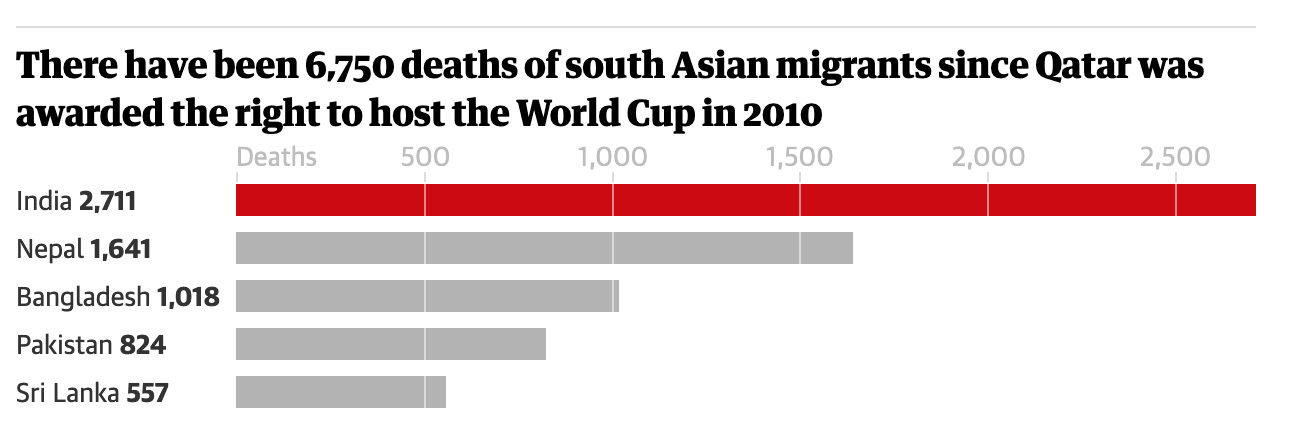557 migrant workers among the 6,500 migrant workers who have died during Qatar’s football World Cup preparations over the last decade, according to a report.
It reported that On average 12 migrants from India, Pakistan, Nepal, Bangladesh, and Sri Lanka have died each week since December 2010 when Qatar was awarded the 22nd FIFA tournament.
The findings were compiled from government sources by The Guardian but the true migrant death toll is believed to be far higher because they do not include figures from countries that send huge numbers of workers to Qatar, including the Philippines and Kenya.
Over the last decade, the Middle Eastern country of just 2.8 million people has speedily constructed seven new stadiums, built a new subway, airport, motorways and even a new city, to transform into a footballing paradise for summer 2022.
But behind the stunning façades of the beautiful game, lies a grim reality of migrant workers packed into horrific dormitory accommodation by night as they spend their days toiling in deadly heat.
While the deaths are not categorised by occupation, it is likely that workers from these countries died while working on projects related to the World Cup, says Nick McGeehan, a director at FairSquare Projects, which specialises in labour rights in the Gulf.
He told The Guardian: ‘A very significant proportion of the migrant workers who have died since 2011 were only in the country because Qatar won the right to host the World Cup.’
Officially there have been 37 deaths among workers on World Cup stadiums, with 34 of these defined as ‘non-work related.’
The terminology raises questions because it has been used in cases where workers have collapsed on construction sites.
Qatar has a migrant workforce of some 2 million, mainly young men from Africa, the Indian subcontinent and the Far East.
Based on the data obtained by The Guardian, the majority of workers’ deaths were put down to natural causes.
More than two thirds of Indian, Nepali and Bangladeshi workers’ deaths were ‘natural,’ while among Indians the figure was 80 per cent.
Often these categorisations were made without autopsy and, therefore, failed to understand the underlying causes for the so-called natural deaths, the report said.
It’s believed that many may have died as a result of Qatar’s oppressive heat, working 10-hour shifts in temperatures of up to 113 Fahrenheit (45C).
Qatari officials have previously claimed they are keeping workers safe by banning manual labour in unshaded outdoor areas between 11.30am and 3pm from mid-June to August.
But analysis shows that even outside those hours, temperatures reach levels that can cause heat stress.
The United Nations said in a report last year that migrant labourers in Qatar faced ‘high’ or ‘extreme’ risk of succumbing to heat stress during half of their working day.
Working in hot weather puts strain on the cardiovascular system and can lead to heart attacks and other complications.
Critics of the working conditions say that this is the reason why such a large proportion of migrant workers’ deaths are categorised as natural, despite a clear correlation to the occupational hazards they face.
In a statement, FIFA said: ‘With the very stringent health and safety measures on site … the frequency of accidents on Fifa World Cup construction sites has been low when compared to other major construction projects around the world.’

